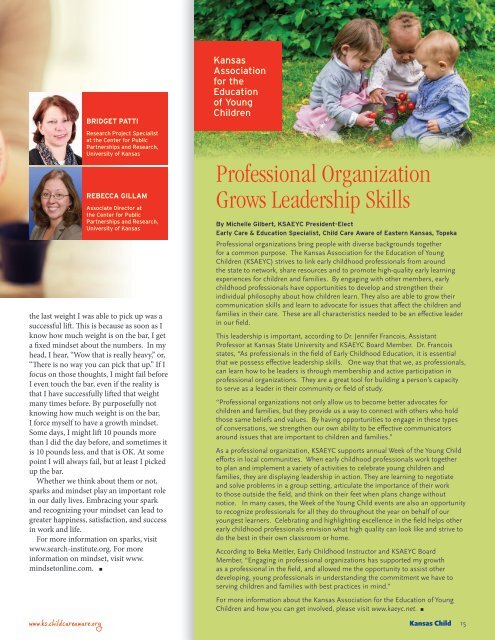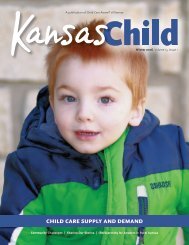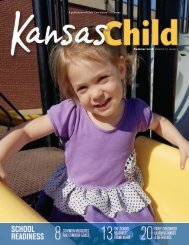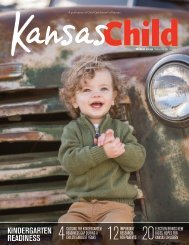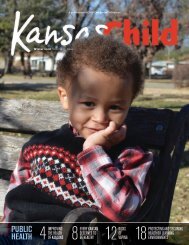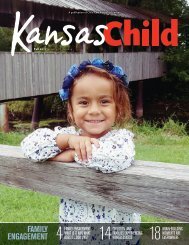2017 Summer Kansas Child
You also want an ePaper? Increase the reach of your titles
YUMPU automatically turns print PDFs into web optimized ePapers that Google loves.
BRIDGET PATTI<br />
Research Project Specialist<br />
at the Center for Public<br />
Partnerships and Research,<br />
University of <strong>Kansas</strong><br />
REBECCA GILLAM<br />
Associate Director at<br />
the Center for Public<br />
Partnerships and Research,<br />
University of <strong>Kansas</strong><br />
the last weight I was able to pick up was a<br />
successful lift. This is because as soon as I<br />
know how much weight is on the bar, I get<br />
a fixed mindset about the numbers. In my<br />
head, I hear, “Wow that is really heavy,” or,<br />
“There is no way you can pick that up.” If I<br />
focus on those thoughts, I might fail before<br />
I even touch the bar, even if the reality is<br />
that I have successfully lifted that weight<br />
many times before. By purposefully not<br />
knowing how much weight is on the bar,<br />
I force myself to have a growth mindset.<br />
Some days, I might lift 10 pounds more<br />
than I did the day before, and sometimes it<br />
is 10 pounds less, and that is OK. At some<br />
point I will always fail, but at least I picked<br />
up the bar.<br />
Whether we think about them or not,<br />
sparks and mindset play an important role<br />
in our daily lives. Embracing your spark<br />
and recognizing your mindset can lead to<br />
greater happiness, satisfaction, and success<br />
in work and life.<br />
For more information on sparks, visit<br />
www.search-institute.org. For more<br />
information on mindset, visit www.<br />
mindsetonline.com. n<br />
<strong>Kansas</strong><br />
Association<br />
for the<br />
Education<br />
of Young<br />
<strong>Child</strong>ren<br />
Professional Organization<br />
Grows Leadership Skills<br />
By Michelle Gilbert, KSAEYC President-Elect<br />
Early Care & Education Specialist, <strong>Child</strong> Care Aware of Eastern <strong>Kansas</strong>, Topeka<br />
Professional organizations bring people with diverse backgrounds together<br />
for a common purpose. The <strong>Kansas</strong> Association for the Education of Young<br />
<strong>Child</strong>ren (KSAEYC) strives to link early childhood professionals from around<br />
the state to network, share resources and to promote high-quality early learning<br />
experiences for children and families. By engaging with other members, early<br />
childhood professionals have opportunities to develop and strengthen their<br />
individual philosophy about how children learn. They also are able to grow their<br />
communication skills and learn to advocate for issues that affect the children and<br />
families in their care. These are all characteristics needed to be an effective leader<br />
in our field.<br />
This leadership is important, according to Dr. Jennifer Francois, Assistant<br />
Professor at <strong>Kansas</strong> State University and KSAEYC Board Member. Dr. Francois<br />
states, “As professionals in the field of Early <strong>Child</strong>hood Education, it is essential<br />
that we possess effective leadership skills. One way that that we, as professionals,<br />
can learn how to be leaders is through membership and active participation in<br />
professional organizations. They are a great tool for building a person’s capacity<br />
to serve as a leader in their community or field of study.<br />
“Professional organizations not only allow us to become better advocates for<br />
children and families, but they provide us a way to connect with others who hold<br />
those same beliefs and values. By having opportunities to engage in these types<br />
of conversations, we strengthen our own ability to be effective communicators<br />
around issues that are important to children and families.”<br />
As a professional organization, KSAEYC supports annual Week of the Young <strong>Child</strong><br />
efforts in local communities. When early childhood professionals work together<br />
to plan and implement a variety of activities to celebrate young children and<br />
families, they are displaying leadership in action. They are learning to negotiate<br />
and solve problems in a group setting, articulate the importance of their work<br />
to those outside the field, and think on their feet when plans change without<br />
notice. In many cases, the Week of the Young <strong>Child</strong> events are also an opportunity<br />
to recognize professionals for all they do throughout the year on behalf of our<br />
youngest learners. Celebrating and highlighting excellence in the field helps other<br />
early childhood professionals envision what high quality can look like and strive to<br />
do the best in their own classroom or home.<br />
According to Beka Meitler, Early <strong>Child</strong>hood Instructor and KSAEYC Board<br />
Member, “Engaging in professional organizations has supported my growth<br />
as a professional in the field, and allowed me the opportunity to assist other<br />
developing, young professionals in understanding the commitment we have to<br />
serving children and families with best practices in mind.”<br />
For more information about the <strong>Kansas</strong> Association for the Education of Young<br />
<strong>Child</strong>ren and how you can get involved, please visit www.kaeyc.net. n<br />
www.ks.childcareaware.org <strong>Kansas</strong> <strong>Child</strong> 15


